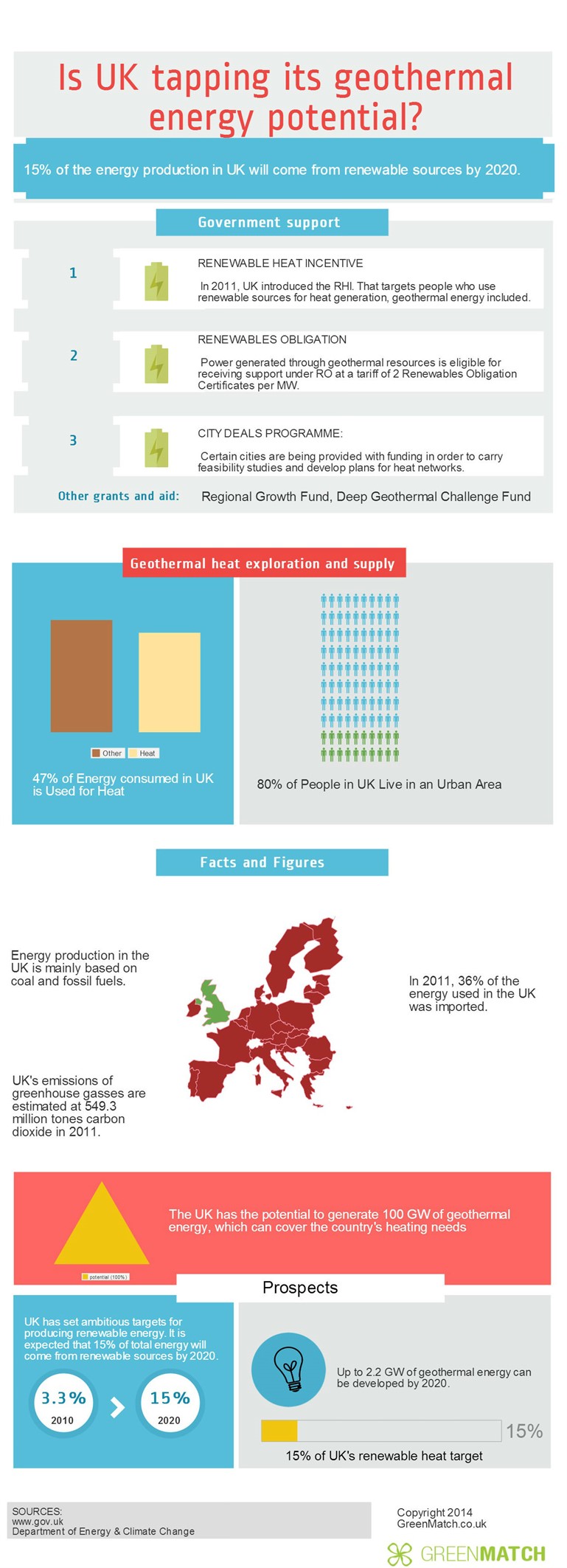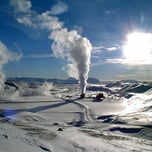Answer these simple questions and we will find you the BEST prices
Which type of solar quotes do you need?
It only takes 30 seconds
100% free with no obligation

You need to fill in only 1 form to get free quotes

We call you to confirm your enquiry

Receive quotes from local installers
- GreenMatch
- Blog
- Is the UK Harnessing its Geothermal Energy Resources?
Is the UK Harnessing Its Geothermal Energy Resources?
The Benefits of Exploring Geothermal Energy in the UK
Geothermal energy has the potential to heat millions of homes in the UK. Despite that, this source of energy is too little used. By 2030, the world will require 60% more energy. At a time when fossil fuels supplies are rapidly consumed, renewable energy has the potential to balance the demand.
The untapped resources have the potential to meet approximately 20% of the UK’s current energy demand.
What Kind of Resources Are Available in the UK?
The type of geothermal resources differs from location to location. In New Zealand, Italy or Iceland, where is a tectonic activity, geothermal energy is being intensely exploited. In these regions, energy comes from sedimentary basins and geothermal electricity can be generated. Currently, the US is the world’s biggest producer of geothermal power.
Other non-volcanic regions have started to tap into these resources for the purpose of producing heat. Countries with similar thermal resources as the UK are Germany, France and Australia. In non-volcanic regions, generating heat from low-heat resources is now possible thanks to Enhanced Geothermal System technologies (EGS) which use low boiling point liquids.
Hot crystalline rocks are the main resource for exploring geothermal energy in the UK. Deep sedimentary basins are present, only in a few locations.
Homegrown in the UK
Geothermal energy has been explored in the UK since ancient times (eg. Bath hot springs).
The UK has a number of low to medium heat resources. Shallow geothermal resources, for example, are becoming more popular lately. The upper crust of the ground (10-15 m deep) is heated by the sun and acts as a heat store. With the help of ground source heat pumps, this energy is extracted and used to heat up and cool homes and buildings.
Geothermal Hotspots in the UK
On the map below you can see the basins, type and location of the geothermal resources in the UK.
Heat only projects: North East, Wessex, Cheshire and Northern Ireland.
These projects will have the highest potential because the resource is widespread and easier to reach.
Power projects: South West England, the Lake District and Weardale and the Eastern Highlands of Scotland have the highest potential to generate power.
How Many Resources Are Actually Being Explored?
Newcastle is leading an ambitious project to harness geothermal energy from 2 km below the city. Boreholes will supply hot water to the city at a temperature of 80°C.
Currently, the city of Southampton is the biggest beneficiary of geothermal power. A geothermal power station is operating here since 1986. The power station provides heating for the city hall, superstore, swimming centre, over 300 flats, hotels, plus the port of Southampton.
Additionally, a deep geothermal commercial power plant project is in development near Redruth in Cornwall with a further site at Eden Project. Currently, there are no deep geothermal plants in the UK. The Redruth site has the potential of supplying over 10 megawatts of electricity and 550 megawatts of heat for the community. Over the course of one year, this is the equivalent of energy produced by 21wind turbines.
Prospects and Funding:
Uk has set ambitious targets in order to harness its geothermal resources. The Department of Energy and Climate is supporting projects with more than £2 million in funding. Third-party companies are currently employed to carry out feasibility studies, reviews on costs and returns, technological development and innovation on methods of extraction. The economic viability of these projects depends, of course, on heat sales. However, combined heat and power systems are being considered in order to provide a viable business case.

Another huge benefit for the UK is developing a secure supply of renewable and low carbon energy.
Jobs
Exploring geothermal energy in the UK will draw paid employment and opportunities for a long time. Opportunity for jobs can be found in sectors such as construction, exploration, drilling and maintenance. The equivalent industry in Germany has created 9000 jobs over the last 10 years related to geothermal power generation.
What Are the Disadvantages?
Geothermal energy exploration involves pumping hot water into the ground at a depth of 5km. Naturally, minor earthquakes can occur when drilling for deep geothermal. For example, in April and May 2011, two minor earthquakes took place near Blackpool. Apparently, they were induced by hydraulic fracture treatments. However, the risk of this kind of earthquakes is low, and one should not worry about structural damages.
Moreover, deep geothermal energy production in the UK has the potential to generate returns for investors but this comes with significant risk and uncertainty. Despite Government funding, projects are not attracting enough commercial interest. More effort needs to be put in proving the resources are viable and the generation potential.
Conclusion
Geothermal energy can help put the UK on the map of countries harnessing renewable energies and low carbon footprint. This will cut the nation’s imported fuels bill as well as the emissions. Not only the UK can meet its power needs through an exploration of geothermal energy but it can also contribute to boosting the economy through job creation.
Fill in the form in just 1 minute
We strive to connect our customers with the right product and supplier. Would you like to be part of GreenMatch?





